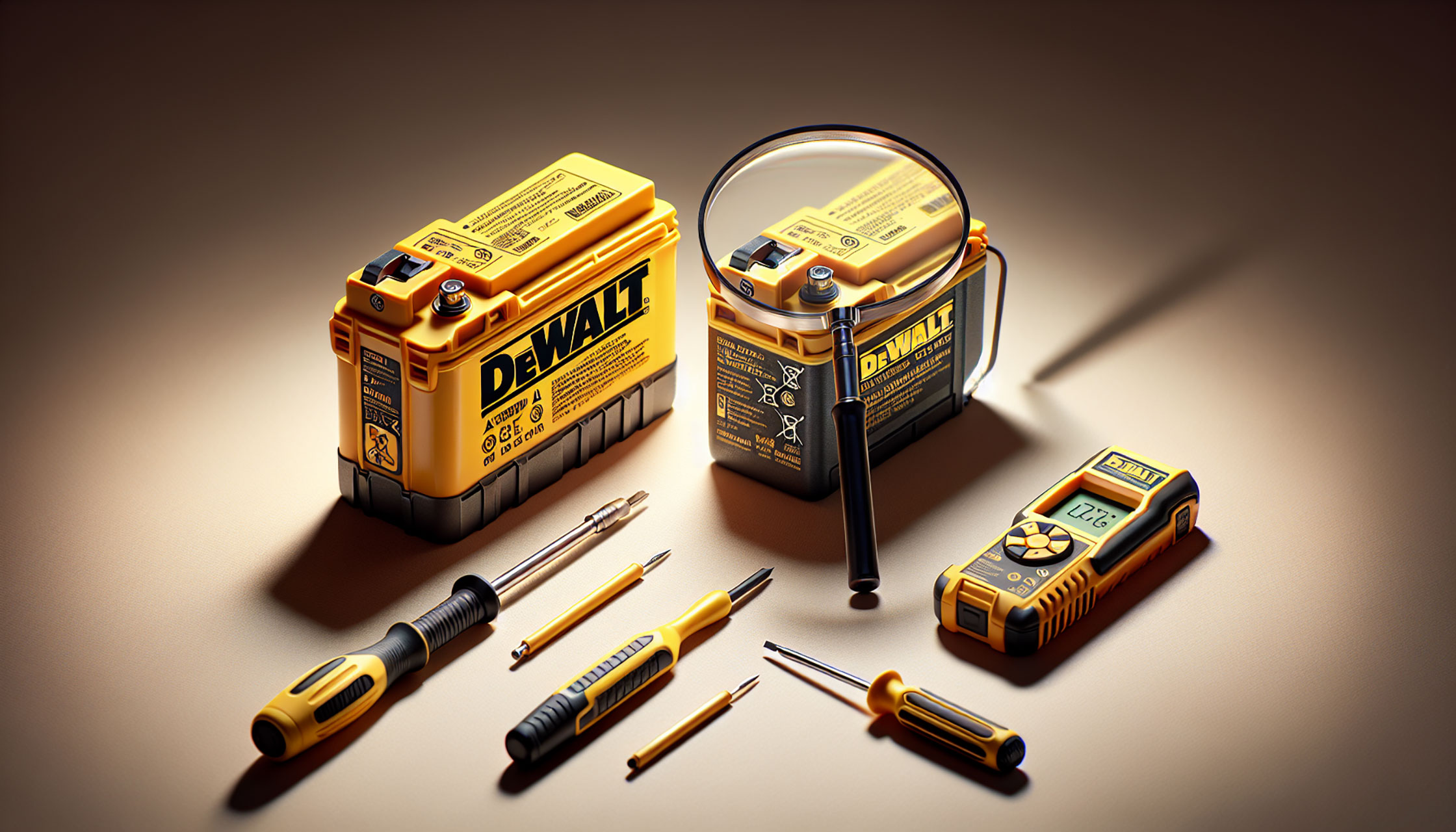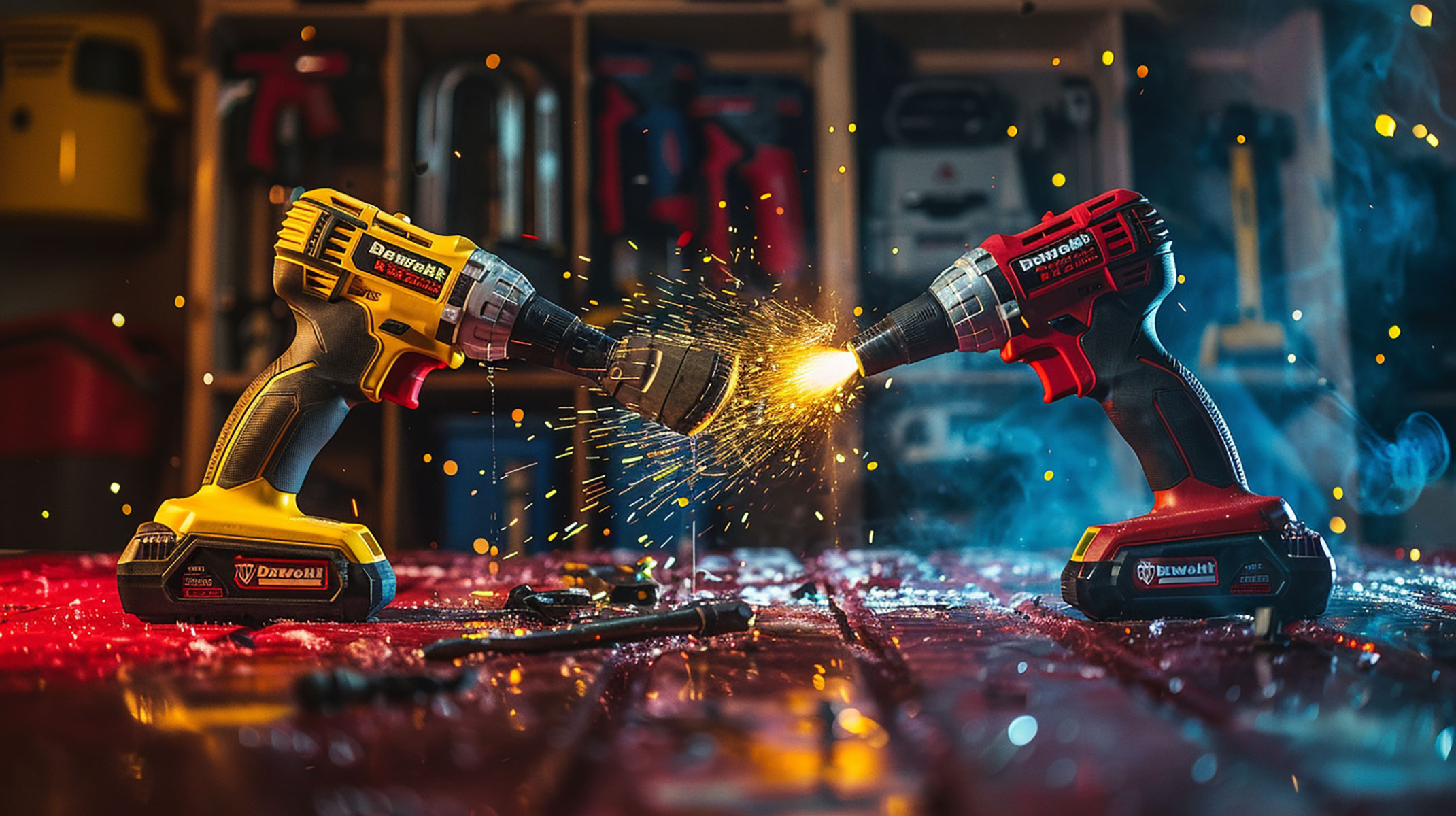
Features
- Includes two 4.0 Ah XR batteries and two 2.0 Ah compact batteries
- LED fuel-gauge charge indicator on each battery
- Compatible with 20V MAX tools and chargers
- Lithium‑ion chemistry
- 3‑year limited warranty
Specifications
| Battery Type | Lithium Ion |
| Battery Voltage | 20 V |
| Maximum Initial Voltage | 20 V (measured without load); nominal 18 V |
| Number Of Pieces | 4 |
| Included Batteries | (2) 20V MAX XR 4Ah (DCB204); (2) 20V MAX Compact 2Ah (DCB203) |
| Has Fuel Gauge | Yes (LED) |
| Product Height | 8.5 in |
| Product Length | 12.5 in |
| Product Width | 3.625 in |
| Product Weight | 70.4 oz |
| Color | Black, Yellow |
Related Tools
Four-pack of 20V lithium-ion batteries containing two 4.0 Ah XR cells and two 2.0 Ah compact cells. Each battery has an LED fuel-gauge indicator. Designed for use with 20V MAX tools and chargers. Includes a limited 3‑year warranty.
DeWalt 20V MAX Battery (4 PK) Review
I’ve learned the hard way that a cordless lineup lives or dies by its batteries. After a few months rotating this DeWalt 20V four‑pack through my shop and jobsite, I’m convinced the mix of two compact 2.0Ah packs and two XR 4.0Ah packs hits a sweet spot for most 20V MAX users. It’s not flashy—no Bluetooth, no fast-charge wizardry—but it’s dependable, predictable power with a thoughtful spread of capacity and weight.
What’s in the box and how I used them
The kit includes two 2.0Ah compact batteries and two 4.0Ah XR batteries, all with the standard DeWalt LED fuel gauge. They’re compatible with every 20V MAX tool and charger I own. As a reminder, DeWalt’s 20V line is nominally 18V under load; “20V MAX” refers to maximum initial voltage without load.
In real use, I naturally split them by task:
- 2.0Ah: impact driver, drill/driver, oscillating multi‑tool, trim router, finish nailers.
- 4.0Ah XR: circular saw, reciprocating saw, angle grinder, compact chainsaw, heavier routing.
The compact packs keep small tools light and nimble, while the XR packs bring runtime and a bit more grunt to high‑draw tools.
Performance and runtime
Runtime is where the mixed pack shines. Using nominal watt‑hour math (Ah × ~18V):
- 2.0Ah ≈ 36Wh
- 4.0Ah ≈ 72Wh
That lines up with my seat‑of‑the‑pants results. On a deck repair, a single 2.0Ah battery drove screws for hours of intermittent work with an impact driver before needing a top‑off. Swapping to the circular saw for cross‑cutting treated 2× lumber, the 4.0Ah pack handled a long stretch of cuts; I needed one mid‑day swap to finish.
The XR packs also hold voltage under load a bit better than the 2.0Ah compacts. On an angle grinder and 6‑1/2" circular saw, they bog less and recover faster after heavy cuts. With a compact chainsaw for pruning, the 4.0Ah proved serviceable for light work; for all‑day limbing you’ll still want larger capacity, but it’s perfectly adequate for occasional cuts.
The fuel‑gauge LEDs are reliable indicators for planning swaps. As with most lithium packs, the last bar disappears faster under heavy load, and gauges can “bounce” a step after the battery cools. No surprises there.
Charging behavior
I charged on a standard DeWalt 20V MAX charger. The 2.0Ah packs top up relatively quickly; the 4.0Ah packs take roughly twice as long. That cadence makes the mix practical: keep a compact pack on deck for trim and fastening while the big pack cycles for saw duty. If you own a rapid charger, you’ll squeeze more uptime from the XR batteries, but it isn’t required to make the kit work smoothly.
Heat management is solid. After extended ripping with the circular saw on a hot afternoon, the 4.0Ah pack was warm but not alarming. The charger didn’t need excessive cool‑down time before starting a charge cycle.
Size, weight, and balance
The 2.0Ah packs are the heroes for overhead or precision work. A trim router with a compact pack feels far more controllable along edges and profiles. On the other hand, slapping a 4.0Ah on an impact driver makes it nose‑heavy and fatiguing if you’re working overhead all day.
On reciprocating saws and grinders, the added mass of the 4.0Ah actually helps. The tool feels planted, and the longer runtime means fewer breaks mid‑cut. In short, use the compacts to save your wrists and the XR packs to save your patience.
Cold weather and storage
Lithium cells lose pep in the cold, and that was true here. Below freezing, the 2.0Ah packs felt the dip more noticeably; the 4.0Ah had better resilience and runtime. Self‑discharge over a month of garage storage was minimal; all four packs held a useful charge when I grabbed them for a Saturday project.
Best practices apply:
- Store around half charge if they’ll sit for a while.
- Avoid leaving them baking in a vehicle.
- Rotate packs so each sees regular use.
Build quality and durability
These are classic DeWalt housings: sturdy shells, tight seams, tabs that click positively into every tool I tried. I dropped one 2.0Ah from a ladder to plywood—no cracks, no drama. The LED gauges are flush enough not to snag in bags. Contacts stayed clean and showed no arcing or discoloration during testing.
The electronics do their job. I hit over‑current protection twice—once on a grinder bind and once choking a hole saw—both recoveries were immediate after clearing the jam.
Compatibility notes
- Works with all 20V MAX tools and chargers I tried, including XR‑branded tools.
- Not FlexVolt. If you run 60V tools, this isn’t a substitute pack. Conversely, the 20V packs are great for keeping your 20V MAX fleet humming without buying into FlexVolt pricing or weight.
Date codes and pack freshness
One practical note: multi‑packs like this can sit in distribution. Check the date code stamp on arrival. In my kit, the dates were fine and performance normalized after a couple charge/discharge cycles. Lithium‑ion does age on the shelf, so if you receive significantly old stock and see reduced runtime or charging issues, use the warranty.
Warranty and service
DeWalt backs these with a limited 3‑year warranty. I haven’t needed service, but that coverage is meaningful for batteries, which are consumables by nature. Register them, hang onto your proof of purchase, and you’ll be set if a pack underperforms prematurely.
Where the kit fits best
- You own several 20V MAX tools and need a balanced pool of batteries to keep multiple tools busy.
- You value light weight for fastening and trim, but need enough capacity to run saws and grinders without constant swapping.
- You want predictable, system‑wide compatibility without chasing higher‑voltage ecosystems.
What could be better
- No fast charger included. If you’re starting from zero, consider budgeting for a better charger to keep the 4.0Ah packs moving.
- The gap between 2.0Ah and 4.0Ah is useful, but some users might prefer two 5.0Ah packs instead of 4.0Ah for heavier saw work.
- As with any large multi‑pack, pack age can vary by batch—check those date codes proactively.
The bottom line on value
As a four‑battery foundation, the mix makes sense. Two compacts keep your lightweight tools agile and always ready; two XR packs carry the load for cuts, grinding, and routing. Calculated purely on watt‑hours, you’re getting a practical spread (roughly 2×36Wh + 2×72Wh) that covers most day‑to‑day tasks without overpaying for capacity you’ll haul around but not use.
There are bigger, smarter, and more feature‑rich batteries in the DeWalt ecosystem, but for the core 20V MAX lineup, these strike a sensible middle ground: reliable chemistry, accurate fuel gauges, and enough capacity to minimize downtime—without turning compact tools into bricks.
Recommendation
I recommend this four‑pack to anyone already invested in 20V MAX who needs to power several tools at once and wants a thoughtful balance of runtime and weight. The compact 2.0Ah packs keep drivers and routers nimble, while the 4.0Ah XR packs deliver the stamina needed for saws and grinders. Add in straightforward compatibility across the 20V MAX system and the security of a 3‑year limited warranty, and it’s an easy choice for most users. If your work leans heavily on high‑draw tools all day, consider supplementing with a couple of 5.0Ah or larger packs; otherwise, this kit covers the bases gracefully and keeps your tools turning without fuss.
Project Ideas
Business
Contractor Battery Swap Service
Offer a subscription-based on-site battery swap to local trades. Techs keep working while you deliver charged 20V MAX packs and retrieve depleted ones. Use the fuel-gauge to validate charge status at handoff and tier plans by amp-hour (2Ah vs 4Ah XR).
Pop-Up Charging Bar
Set up a portable phone/laptop charging booth at markets, festivals, or emergencies using 20V-to-USB-C PD hubs. Display the LED fuel-gauge on each battery so customers see available capacity. Sell day passes or per-charge fees and rotate 4Ah/2Ah packs for continuous uptime.
Emergency Power Kits
Assemble and sell grab-and-go kits featuring a 20V battery dock, LED lantern/strip, USB-C PD outputs, and a compact radio. Offer packages with two 4Ah XR for longer runtime and two 2Ah for lightweight backups. Market to homeowners, small retailers, and neighborhood preparedness groups.
3D-Printed Docks and Mounts
Design and sell custom 20V battery holsters, belt clips, wall organizers, and weather-resistant docks with integrated DC-DC boards. Bundle with instructions and safety notes. Offer color-coded options for 2Ah vs 4Ah pack footprints and license files for makers to customize.
Battery-Powered Event Lighting Rentals
Rent portable LED uplights, string lights, and signage powered by 20V MAX packs for weddings and pop-ups. Use 4Ah XR packs for long events and 2Ah for short transitions. Include spare batteries and train staff to use the on-battery fuel-gauge to schedule swaps.
Creative
Backpack Power Box
Build a compact power box that docks a 20V MAX battery and provides USB-C PD, 12V DC, and a dimmable LED worklight. Use an OEM-style battery adapter with protections plus DC-DC converters. Swap in the 4Ah XR packs for long trips, and the 2Ah packs to keep weight down. The LED fuel-gauge makes it easy to rotate packs in the field.
Cordless Lantern + Path Light Set
Create a modular outdoor lighting kit: a central lantern and snap-on path light stakes that all run from a single 20V MAX battery dock. Include magnetic bases for garage use and a low/high mode to match 2Ah vs 4Ah runtime needs. Great for camping, patios, or emergency outages.
Rain-Barrel Garden Pump Cart
Build a small wheeled cart with a 20V-compatible water pump, inline filter, and hose reel to move rainwater from barrels to planters. Use 4Ah XR packs for longer watering sessions and 2Ah for quick tasks. Add a battery bay window so the LED fuel-gauge remains visible.
Busker/Field Audio Amp
Make a portable Class-D speaker/amp box powered by a 20V MAX battery adapter. Include instrument/mic inputs, Bluetooth, and a fast swap battery door. 4Ah XR batteries deliver multi-hour sets; 2Ah packs are perfect for rehearsals. Add a voltage display and use the battery’s LED gauge before each set.
Wall-Mount Battery Rack + Test Station
Design a 3D-printed wall rack that stores, labels, and quick-tests packs. Integrate a simple load tester/USB power board and viewing slots so you can press the built-in LED fuel-gauge without removing batteries. Keep the heavier 4Ah packs low and the compact 2Ah packs up top.




